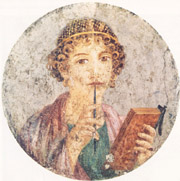
UNINHIBITED EROS
Love was a common topic of conversation in Pompeii. Feelings, passions, poetic love, sex, homosexuality, prostitution and so forth were all part of daily life and not a source of prejudice. The concept of obscenity seems to have been unknown. Love and sex were considered earthly practices of a man’s life that were encouraged by the benevolence of Venus. The thousands of examples of graffiti found on the town’s walls are unequivocal proof of what the people of Pompeii thought about love and sex. Pompeii was thus held to be the town of Venus, the goddess of love and the regenerative force in nature to whom Silla dedicated the colony. We therefore find several places of cult worship dedicated to the goddess, and she is also the subject of many paintings and poetic graffiti found scratched into the walls, Venus was deeply rooted in the life of every Pompeian and no one seemd to want to hide this.
In the Basilica we find clear proof of this in an inscription: If You are looking for sweet embraces in this town, you will find that all the girls here are available.
The town had numerous brothels, or lupanares, with young women from every part of the empire, each one specialised in a aprticular sexual technique. Rooms for sexual encounters were also to be found in many taverns, bath and even ordinary houses which sometimes had rooms decorated with erotic frescoes for the sexual entertainment of guests.
The use of phallic symbols in frescoes, sculptures, charms, lamps, and in many corners of the town’s houses, on the facades of the buildings and at the entrance to shops was very common. Surprisingly, these actually referred to magical practices as the phallus was considered the primordial positive force in nature and, thus, the main and most effective amulet against the evil eye and a sure way of ensuring health and well-being.
Opinions about the women of Pompeii
What did the men who lived in Pompeii up to 79 A.D. think of the town’s women? Their “opinions” are expressed in the many examples of graffiti found scratched in the walls.
“You are Venus”, writes one man before the name of his partner; and another states “If you have not seen the portrait of Venus by Apelles, look at my girlfriend, she’s just as beautiful as her”.
There are also numerous sensual comments, such as “ …may you thus always be in flower, oh Sabina, and maintain your good looks fo ever”. Among the graffiti we also find admiration for women of more doubtful virtues: “Beautiful girl”, writes one lover who is aware that he shares his girl-friend with others, “for Ceius and many more”. The walls of Pompeii are literally full of comments inspired by the Roma poets. “Love moves me”, writes one “now that I write and Cupid guides my hand: may I die if I choose to be a god, without you by my side..”.






